For a man at the cutting edge of modern theatre, Australian director Simon Stone has always had a healthy obsession with the past. From his groundbreaking 2012 Belvoir Thyestes, a bloodthirsty contemporary retelling of Seneca’s take on the vicious dynastic politics of the House of Atreus, to his shocking, visceral Yerma, which based a 21st-century woman’s spiralling preoccupation with conceiving a child on Lorca’s 1934 original, he’s forced us to confront ancient horrors we likely hoped belonged to bygone times.
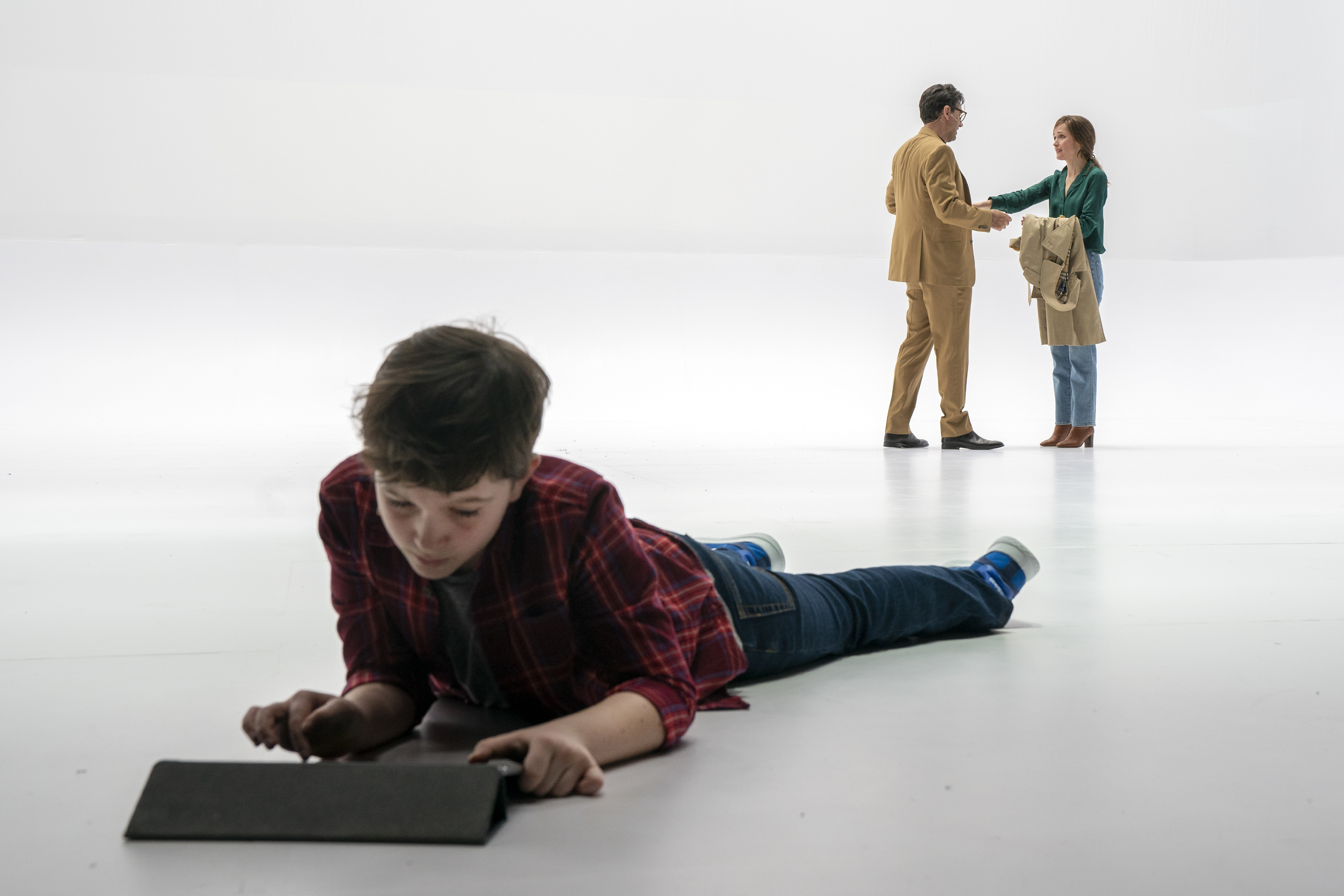 Gabriel Amoroso as Edgar, Rose Byrne as Anna and Bobby Cannavale as Lucas in Medea. Photo © Richard Termine
Gabriel Amoroso as Edgar, Rose Byrne as Anna and Bobby Cannavale as Lucas in Medea. Photo © Richard Termine
“Why choose this very old play?” David Lan asks the director in the program note for Stone’s Medea, which has transferred from London’s Young Vic to Brooklyn Academy of Music. “Because what happens in the play keeps happening,” is the simple answer. Stone goes on to explain that it may be less common nowadays, but women still kill their children (though far less often than men do), his point being that we ignore the warnings of writers like Euripides at our peril.
It turns out the child-murdering episode is not in the older versions of the complicated, often confused Medea story. It was, in fact, a plot element invented by Euripides for his distinctively personalised play first produced in Athens in 431 BCE. Before then, the children were said to have died accidental deaths, or to have been killed by the citizens of Corinth in revenge for Medea’s murder of their Princess. By placing the emphasis on a woman capable of slaughtering her own offspring, Euripides uses adultery, betrayal, abandonment and revenge to play down the magical elements and put the focus on Medea as wife and mother. All of this is brilliantly paralleled in Stone’s new version, written in clear, convincing and refreshingly direct contemporary prose.
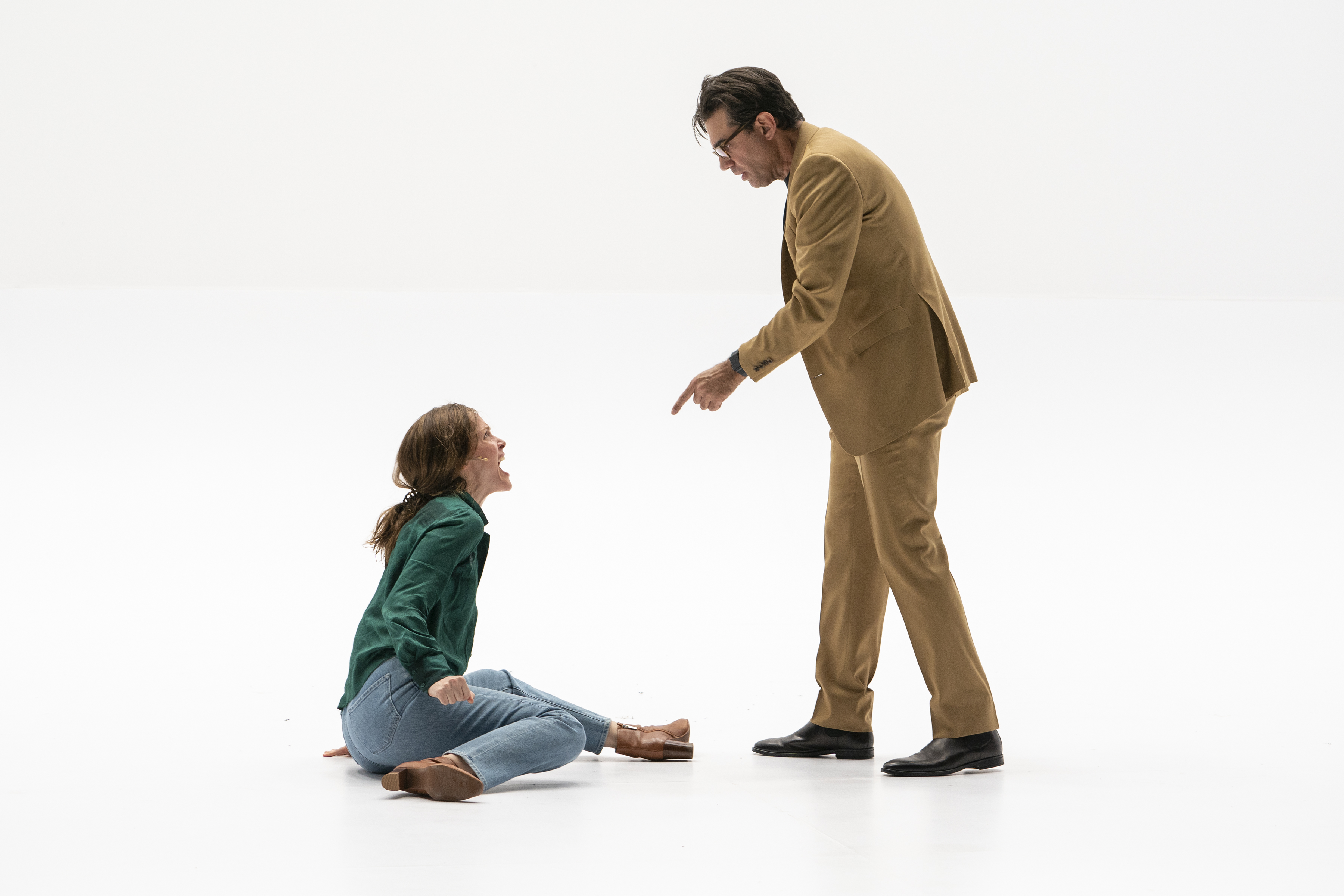 Rose Byrne as Anna and Bobby Cannavale as Lucas in Medea. Photo © Richard Termine
Rose Byrne as Anna and Bobby Cannavale as Lucas in Medea. Photo © Richard Termine
It’s an effective update. In Euripides’ original, Medea is the sorcerous daughter of the King of Colchis whose magic has allowed Jason to steal the Golden Fleece. Fleeing to Corinth, Jason has two children with Medea before transferring his attentions to Glauce, daughter of King Creon. In her abandonment, Medea kills Jason’s future bride and father-in-law before murdering her young family and escaping to Athens in the Sun God’s chariot.
In Stone’s version, Anna is a successful doctor whose technical genius has helped her less accomplished lover Lucas win a major prize. “I was a great scientist, you were a good sounding-board,” is how she puts it. After a few years of marriage, Anna discovers Lucas is having an affair with Clara, the daughter of the owner of the company they work for. When Lucas discovers that Anna is trying to poison him slowly with home-concocted Ricin he persuades her to section herself to avoid a scandal. On her release, Anna tries to win Lucas back, but his declaration that he intends to marry Clara provides the flashpoint for events that parallel Euripides’ original (all bar the escape in the chariot). The only trick Stone perhaps misses is Medea’s role as outsider, especially relevant in an age where certain governments seem determined to exploit society’s hardwired mistrust of the immigrant.
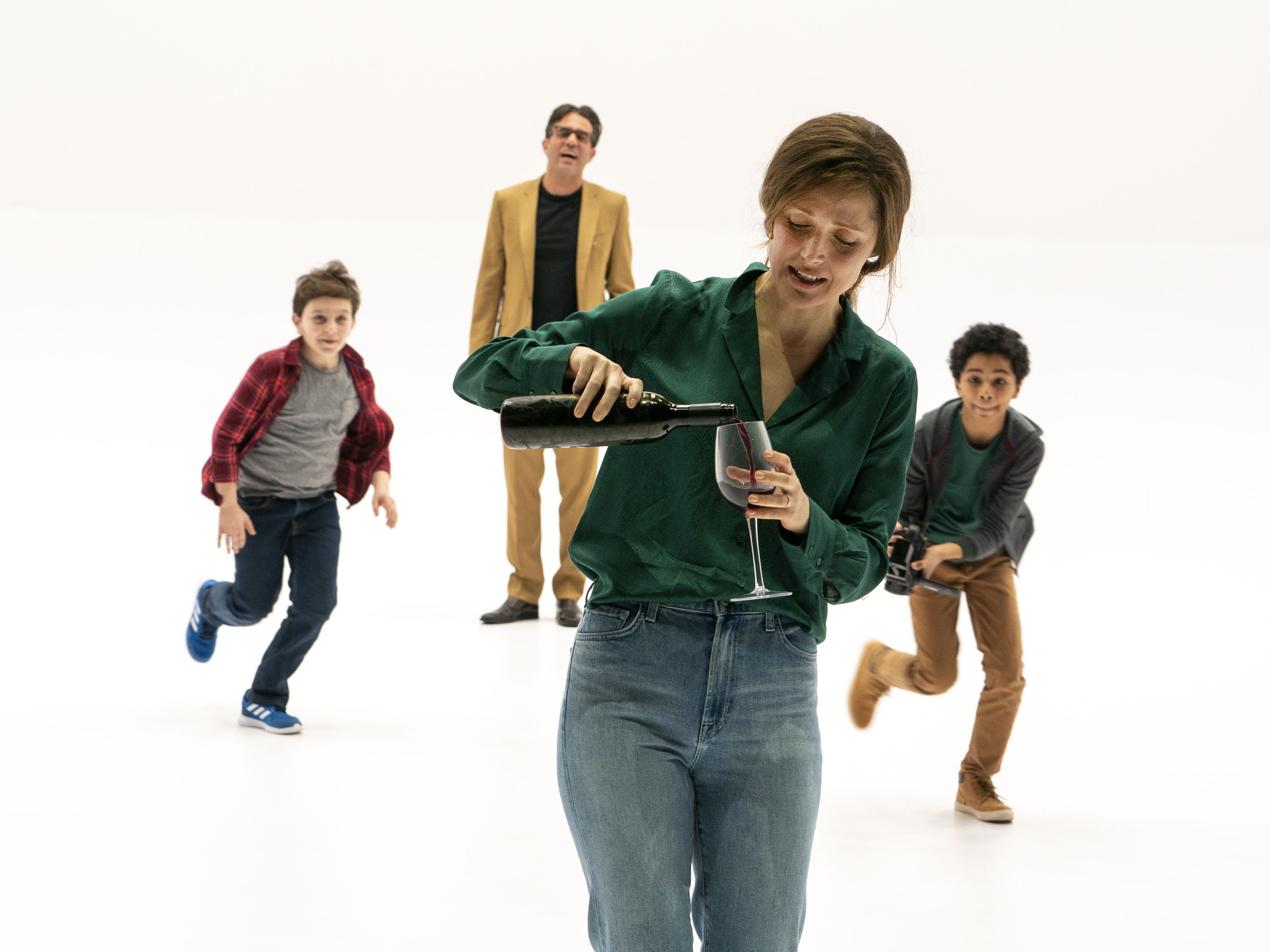 Rose Byrne as Anna, Bobby Cannavale as Lucas, Gabriel Amoroso as Edgar and Emeka Guindo as Gus in Medea. Photo © Richard Termine
Rose Byrne as Anna, Bobby Cannavale as Lucas, Gabriel Amoroso as Edgar and Emeka Guindo as Gus in Medea. Photo © Richard Termine
The production has found a magnificent Anna in Rose Byrne. The Australian actor has an exceptional ability to do a great deal while appearing to do next to nothing. Her hugely expressive eyes are regularly caught in compelling closeup and projected onto the vast screen that sits above Bob Cousins’ starkly uniform white playing area, immaculately lit by Sarah Johnston’s clinical lighting. Stone’s carefully crafted text and Byrne’s way with irony have a way of disarming you. Frequently funny, the script is adept at picking up the empty inadequacy of words when human beings are pushed way beyond their comfort zones. Byrne’s Anna is an arch manipulator, as befits her status as the smartest woman in the room, but her mounting obsession, muddled by the Prozac she has been prescribed to address her “mental health issues” emerges with a terrifying honesty. Her gradual unravelling is a gut-wrenching tour de force.
Her Lucas, Byrne’s real-life husband, American actor Bobby Cannavale, is the ideal foil. Outwardly charming, superficially sexy, yet weak to the very core, his inability to keep it in his pants combined with a typical masculine vanity and narrow minded professional ambition proves a fatal combination. Despite all that, you do genuinely feel for him as a decent man at heart, a tribute to Cannavale’s ability to tap into a slightly vulnerable wide-eyed charm and project twisted fragments that imply the man’s latent innocence. For all his self-centred allure, this Lucas is more than just a serial womaniser. By the end you can certainly feel for him as one of the tale’s many victims.
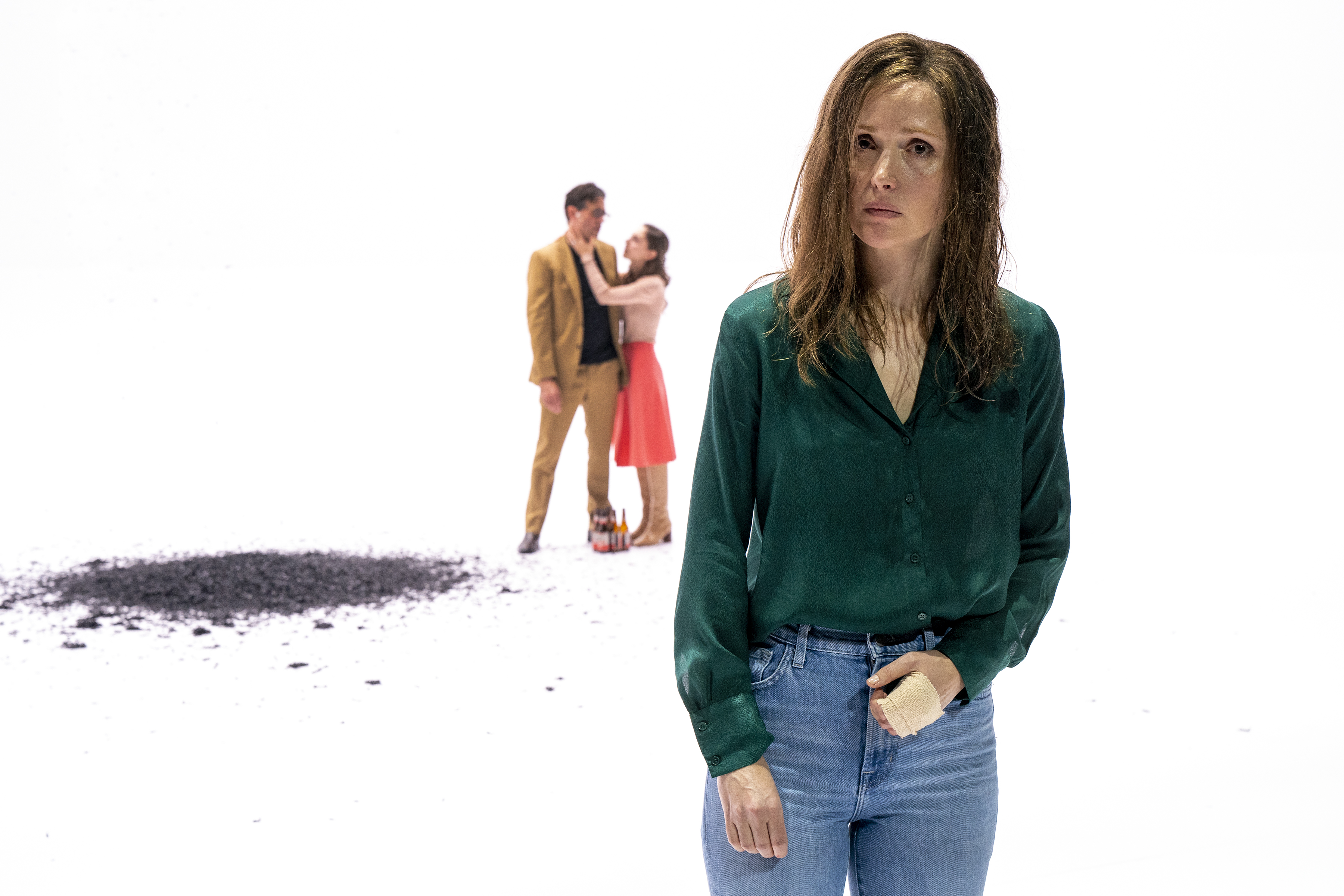 Rose Byrne as Anna, Bobby Cannavale as Lucas and Madeline Weinstein as Clara in Medea. Photo © Richard Termine
Rose Byrne as Anna, Bobby Cannavale as Lucas and Madeline Weinstein as Clara in Medea. Photo © Richard Termine
Among the rest of the company, Madeline Weinstein catches the dual nature of Clara, on the one hand an inexperienced young woman who has fallen for a handsome social climber and wants to be accepted by his children, on the other a spoiled “princess” used to getting her own way. As her father, Christopher, Dylan Baker’s initial decorum gives way to expose a ruthless operator with a nasty line in locker-room talk who will dump a former employee and sell his daughter down the river. Victor Almanzar is engaging as Herbert, the bookstore manager who has taken on Anna as part of a rehabilitation program. His wryly told tale of a woman who severed her husband’s penis lightens proceedings before concluding with a stinging verbal one-liner. Jordan Boatman is deeply sympathetic as Elspeth, Anna’s concerned social worker, trying to hold things together even as she can see them disintegrating before her eyes.
At the heart of the show are the children – at this performance the pitch-perfect Gabriel Amoroso and Emeka Guindo – smart, funny and sad by turns. To his credit, Stone never sentimentalises the family unit but throws a painful spotlight on Anna’s complex relationship to sons whose birth she eventually blames for having exhausted their parents’ sexual relationship. “That was when you stopped making love to me,” she opines, to which Lucas snaps back that instead it was Anna who turned sex “into such a chore.” The idea that Edgar, the older sibling, frequently videos his parents for some kind of home documentary pays all sorts of dividends.
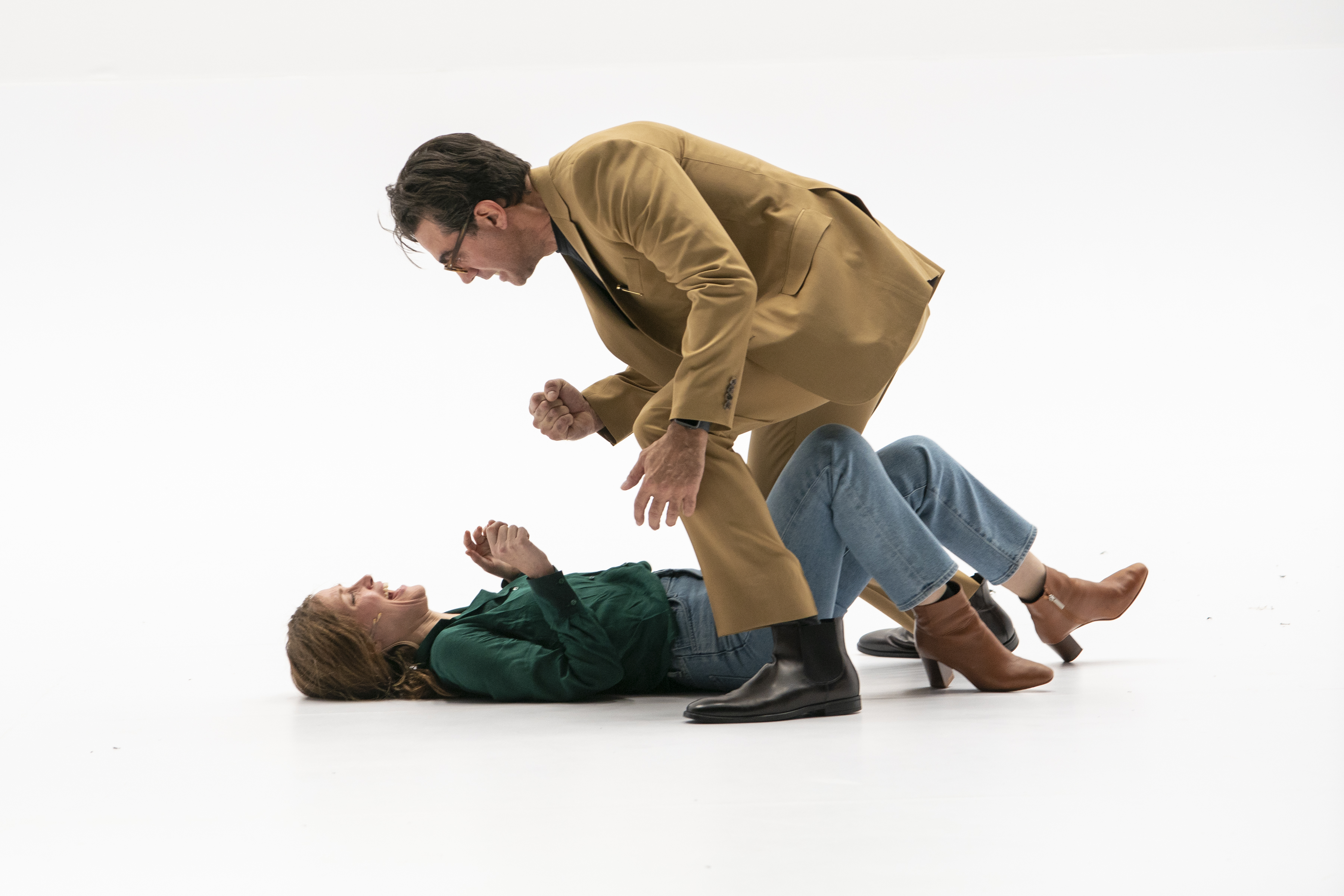 Rose Byrne as Anna and Bobby Cannavale as Lucas in Medea. Photo © Richard Termine
Rose Byrne as Anna and Bobby Cannavale as Lucas in Medea. Photo © Richard Termine
Scrupulously directed, Stone’s staging flows with an effortless grace, characters seeming to float timelessly against Cousins’ gravity-free backdrop. Scenes merge and overlap to maintain pace and build tension, while Stone’s directorial eye and ear is alert to every emotional nuance in this complicated, often harrowing story. He’s ably supported by An d’Huys’ unobtrusively appropriate costumes, Stefan Gregory’s subtle, disturbing music and sound design, and Julia Frey’s careful and revealing video design, each of which achieves a great deal without ever drawing attention to themselves. For all its horrors, in creating a convincingly realistic play for today, Stone has done Euripides, and perhaps Medea herself, proud.
Medea is at Brooklyn Academy of Music until February 23













Comments
Log in to join the conversation.